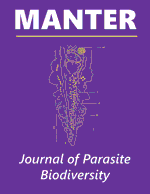Parasitology, Harold W. Manter Laboratory of

MANTER: Journal of Parasite Biodiversity
ORCID IDs
Molnár 0000-0002-2458-4659
Knickel 0000-0003-1496-7864
Marizzi 0000-0001-9065-3352
Date of this Version
12-27-2022
Document Type
Article
Citation
MANTER: Journal of Parasite Biodiversity (December 27, 2022) number 28
doi: 10.32873/unl.dc.manter28
Abstract
The emerging infectious disease (EID) crisis has been challenging global health security for decades, dealing substantial damage to all socioeconomic landscapes. Control measures have failed to prevent or even mitigate damages from an accelerating wave of EIDs, leading to the emergence and devastation caused by the COVID-19 pandemic. In the wake of the pandemic, we must critically review our public health policies and approaches. Current health security measures are based on the evolutionary theorem of host-parasite coevolution, which falsely deems EIDs as rare and unpredictable. The DAMA protocol (Document, Assess, Monitor, Act) is nested in a novel evolutionary framework that describes how emergence can be prevented before the onset of an outbreak. In this paper, we discuss the importance of establishing efficient communication channels between various stakeholders affected by EIDs. We describe implementation strategies for preventive interventions on global, regional, and local scales and provide guidelines for using such strategies in the relevant policy environments of human, livestock, and crop diseases.


Comments
Copyright © 2022, Molnár, Knickel, and Marizzi
License: CC BY-NC-SA 4.0 International